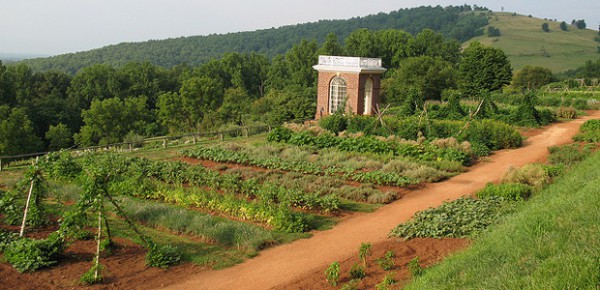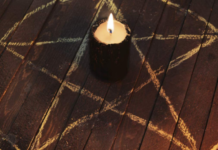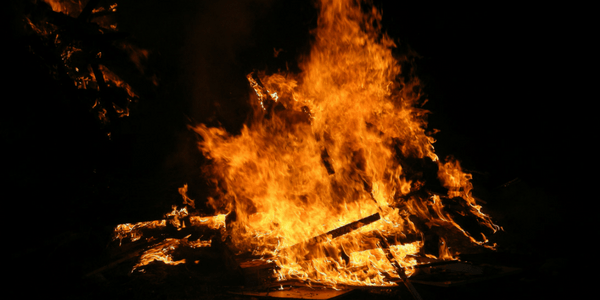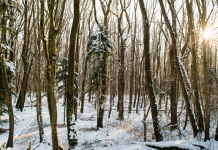 I was Wiccan for several years. It was my first exposure to Paganism, as it is for many people. I enjoyed feeling connected with nature, I was happy to find a faith that didn’t shame me for having a vagina, and of course, like most geeky 11-year-old girls would, I relished the feeling of empowerment that knowledge of magick brought.
I was Wiccan for several years. It was my first exposure to Paganism, as it is for many people. I enjoyed feeling connected with nature, I was happy to find a faith that didn’t shame me for having a vagina, and of course, like most geeky 11-year-old girls would, I relished the feeling of empowerment that knowledge of magick brought.
It wasn’t long before something in me I couldn’t quite identify began to butt heads with what I was reading and practicing. There are many aspects of the Horned God I felt (and still feel) a connection to, such as his associations with wild nature, magick, and the death and rebirth cycle, but I felt discouraged from exploring these ideas because they were deemed “masculine.” Instead, I tried to explore the mysteries of the Goddess as I felt I was “supposed” to. Despite being young, I felt unable to relate to the Maiden, and I felt stifled by the seeming inevitability of becoming a Mother, then a Crone — neither of which particularly appealed to me. It was also around this time that I began to realize I was gay, which only served to intensify my feelings of alienation. How could a spiritually necessary “union of opposites” occur when I didn’t even find my so-called “opposite” attractive?
There lay the problem. I worshipped deities I believed were all-encompassing, but I could not see myself within them, and that truly hurt. I thought there was something deeply wrong with me. It wasn’t until years later that I became aware of non-binary identities, and found a word (agender) to describe that something I felt. I carried on for a few years, thinking I just needed to fake it until I made it, until eventually in my late teens I put down my Wicca books and started looking elsewhere. I’ve dabbled in many, many different belief systems, and ended up with a practice heavily influenced by Celtic and Greek Paganism, Otherkin culture, and the Cthulhu Mythos — a universe full of strange, amorphous, ambiguously gendered beings that I could relate to. But that has left me feeling distant from the here and now and so, at a slightly more mature 22, I’m looking back to my time with Wicca to find ways to connect to the world I’m currently inhabiting.
I could have leafed through my books, picked out some rituals and meditations and left it at that, but it got me thinking: can Wicca and other fertility-based faiths be reconciled with gay and non-binary identities? I felt I owed myself an answer if nothing else, but then I thought of others who might be in this same position and decided I should share what I’ve found.
Where we’re coming from
The beginning is usually a good place to start, so I started by looking deeper into Wicca’s history. I won’t go into too much detail about the origins of the modern Pagan movement, since that information is readily available, but I did want to touch on the harmful attitudes of some prominent Wiccans, and how they are still perpetuated in the religion today.
I started with the big guy, Gerald Gardner, and I found some things that didn’t make it into the Wicca 101 books. Lois Bourne, a High Priestess in one of Gardner’s covens, wrote in her book Dancing with Witches that Gardner was deeply homophobic, regarded homosexuality as a transgression of natural law, and even flat-out stated that “It is not possible to be a homosexual and a witch.” Gardner was also what I call a sneaky sexist — a man who claims to support and respect women, but considers them inferior to men, apparently not seeing the contradiction. “For the Gods love the Wica, as a man loveth a woman by mastering her,” he wrote in his “Old Laws.”1 He also argued that a High Priestess’ power comes from the High Priest, and that she should step down from her role once she becomes old, citing the necessity of youth and the virtue of humility — yet, of course, there were no similar age or meekness requirements for the High Priest.2
I looked into Dianic Wicca as well, thinking that since is has less emphasis on the God and Goddess duality, I might be able to relate to it more. I found the heavy focus on feminism appealing, but that lasted about a minute until the movement’s ugly history of gender essentialism (the mentality that women are A, men are B, and nothing outside of those ideas exists) and transmisogyny (that nasty combination of transphobia and misogyny directed at trans women) revealed itself. Many Dianic events are billed as welcoming “women-born-women,” intended to specifically exclude transwomen from participating. Dianic Wicca’s founder, Z Budapest, is frighteningly transphobic and has perpetuated and encouraged these attitudes from the beginning.3 Recently, in 2012, after a group of transwomen protested being excluded from a “women-only” ritual, Budapest responded by calling them male, using transphobic slurs and accusing the women — who simply wanted to join other women in a women’s space — of some vast patriarchal conspiracy to deny women the right to their own spirituality.4
One could make an argument for Gardner being a product of his time, but that’s no reason not to be critical of what he wrote, and it’s certainly no excuse for contemporary Wiccans to perpetuate his hateful attitudes. I recognize that these views continue to be endorsed by only a small minority, and that most Wiccans aim to be more welcoming and accepting. But because the Pagan community is generally a safe(r) place for LGBTTIQA+ folks, it makes it especially tragic when hateful beliefs rear their heads.
Many Wiccans cite the “Charge of the Goddess” (which states that “All acts of love and pleasure are my rituals”) as an argument for the inclusion and celebration of LGBTTIQA+ identities. It’s a step in the right direction, and a sentiment I appreciate, but it still comes from a faith that defines divinity as a cisgendered straight couple having sex. There is also, as I mentioned before, the issue of non-binary identities and how Wicca’s heavy woman versus man focus tends not to acknowledge the many identities outside of “woman” and “man.”5 These identities are part of natural human variance, and right now Wicca has no real framework to understand or celebrate them. How much of all this is a consequence of Gardner’s beliefs and how much came from his sources I don’t know, but it is omnipresent in the faith and can be a source of inner conflict for queer Pagans.
I don’t think Wiccans are bad people, and I don’t think Wicca as a faith is inherently exclusionary. The core of Wicca — a faith that seeks to celebrate nature and its cycles — is good. I just think there are a few things that can be done to help people like me feel more included.
What we can do
I believe that the words we use shape our thoughts, and so how we talk about things is very important. With that in mind, I started brainstorming ways to modify existing Wiccan ideas to be more inclusive.
I’ll start with what I spoke about before: the common archetypes in Wicca and how I found them alienating. I’m not denying the importance of balance or archetypes, or saying that dualistic philosophy is inherently flawed. But I do feel very strongly that over-simplifying others in order to fit them into an archetype-box is harmful to everyone involved. It harms the one in the box, who now cannot express themselves, and harms the one who put them there, who now cannot learn from them.
Take the Maiden-Mother-Crone archetype, for example. Even though I can’t relate it to myself, I can acknowledge that power it has and the important place it can hold in someone’s life. But there are countless others, and each hold some important place in our collective psyche. If the traditional narratives aren’t working for you, I’d suggest giving Carl Jung or Joseph Campbell a look, and discovering which archetypes speak to you.
There is also the issue of sex and spirituality, and how they’re discussed. Wicca is a sex-positive fertility religion; it holds sex as sacred because it creates life and gives pleasure. I think that’s great; sex is a beneficial thing for many people and people should be able to have as much or as little as they want without being shamed. But I’ve noticed that the opposite tends to happen in Pagan circles. In such a sex-focused environment, people who don’t want sex or don’t want to talk about it are considered the outliers, which can be problematic. For instance, when someone claims that everyone has sex or masturbates, or ties everything in life, spiritual or not, back to (human-style) sex, it is a form of asexual erasure. Asexual people, who don’t experience sexual attraction, exist as part of the natural spectrum of human sexuality,6 and I feel they should be honoured for that. If sex is important to your practice, that’s great, just recognize that it isn’t as universal as you might think. Simply assume nothing about another person’s sexuality when you meet them, and always speak about it respectfully.
I feel it’s worth pointing out that many animals other than humans have exhibited same-sex attraction (a good point to bring up if someone claims that being gay is “unnatural”), and others have biological sexes that are nothing like humans’. There is also incredible variance in plants and how they reproduce. I plan to explore honouring gay and non-binary forms in nature in much greater depth in another article, so keep your eyes peeled!
It would also go a long way (and be very simple!) to re-word rituals to be more open and inclusive. As an example, I’ll use “The Fivefold Kiss” which, unless things have drastically changed since I’ve stopped practicing Wicca, is pretty common and standard. Let’s take a look at it:
Blessed be thy feet, that have brought thee in these ways
Blessed be thy knees, that shall kneel at the sacred altar
Blessed be thy [womb/phallus], without which we would not be
Blessed be thy breasts, formed in [beauty/strength]
Blessed be thy lips, that shall utter the Sacred Names
Lines 1, 2, and 5 are fine and dandy, but with 3 and 4, we run into some issues. Namely, people being defined by their genitals. Let me put it this way: if I were a cisgendered woman who wanted to bear children, I wouldn’t mind that blessing on my womb, but since none of those things apply to me, it rings hollow. Not everyone’s identity and self-image match their biological bits, and even out of those who do, not all of them are interested in sex or baby-making. I’ve seen some covens use “Blessed be thy sex” which is nice; it’s more universal, and acknowledges intersexed individuals as well.
But I’d still like to come up with one more, one that doesn’t involve genitals. This is not because genitals are “dirty” in any way, but because some people do not want others’ attention (or mouths!) focused on them like that. So let’s think of another central part in that area of the body. How about the centre of gravity? It’s universal, essential, and has a certain sturdy appeal to it. Maybe something along the lines of “Blessed be thy centre, that guides you in balance and peace”?
And what about the breast? Why is the breast of a woman always formed in beauty, and the breast of a man, in strength? I might suggest using “strength” universally, or emphasising the breast as the seat of the heart and lungs, and writing a blessing accordingly.
Anyone who identifies with the original blessings is, of course, welcome to keep using them. If you’re deeply connected with your womb or phallus and your beautiful or strong breasts, that’s perfectly valid. My suggestion would be to have many potential blessings available, and simply ask each participant beforehand how they would like to be blessed.
So there we have it. Some rambling, some history, some working suggestions. The question is, did I do what I set out to do?
So what now?
I do have an answer on whether fertility-based faiths can be compromised with queer identities and that answer is: potentially. There’s been a lot of progress over the decades, but I think there’s a lot of systemic oppression left in it that might take more than some re-wordings to fix, and I believe that should be handled by someone more knowledgeable in these matters than I. Personally, I don’t see myself returning to Wicca, having found other Pagan paths that speak to me more. But I think I have a better understanding now, and I hope that this can be helpful to someone else going who is questioning their faith or identity.
Image credit: MrTinDC
- From the Gardenarian Book of Shadows, “The Old Laws.” Specifically, sections A and B. [↩]
- ibid. [↩]
- See “Oh, My Pop Culture Goddess: Transgender Issues in Wicca and Paganism” for more on this. [↩]
- See “Women Born Women: Dianic Wicca and Transphobia” for more coverage. [↩]
- For more on this, see “Genderqueer Identities and Terminology.” [↩]
- See “Asexuality 101” for more. [↩]








